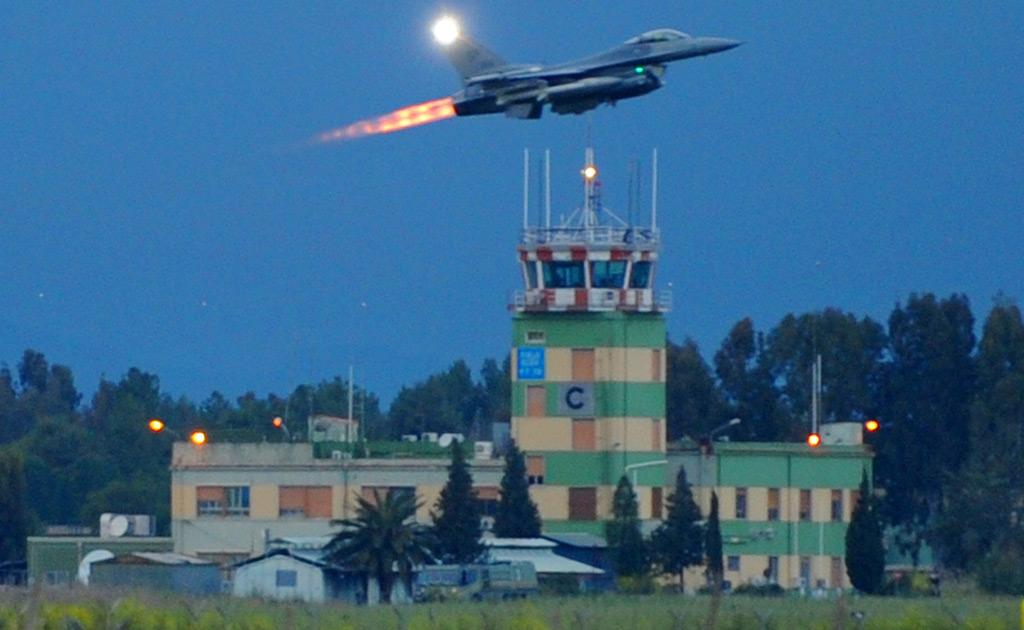US fighter plane crashes in Libya after mechanical failure (UPDATES) (VIDEO)
A US Navy F-16 fighter jet based at Sigonella airbase on the Italian island of Sicily takes off on March 21, 2011 to take part in operations in Libya.
The U.S. military confirmed one of its fighter jets made a crash landing in Libya after suffering mechanical failure during a third night of allied attacks on Muammar Gaddafi's air defenses.
Reports said the F-15 Strike Eagle fighter jet came down in a field near the rebel stronghold of Benghazi after suffering mechanical failure. U.S. military spokesman Kenneth Fidler told the BBC that there was no indication of "hostile fire."
Both crewmen ejected safely from the aircraft. The Washington Post said one was brought to safety by rebels while the second was airlifted by a U.S. military Osprey tilt-rotor aircraft, capable of making vertical landings.
AP said the crew had become separated after they ejected at high altitude. Vince Crawley, a spokesman for the U.S. military's Africa Command, said both had suffered minor injuries.
The Telegraph, which broke the story, carried a photograph purportedly of the aircraft on its website. It showed a badly burned and smashed wreckage surrounded locals.
As Allied forces bombarded Libya for a third night, President Barack Obama faced growing criticism at home and abroad over his decision to support the military campaign in the north African country.
Allied missiles again pounded Libyan targets, with officials of Muammar Gaddafi's regime claiming civilian casualties. There were also reports of fighting on the ground between rebels and Gaddafi's troops, despite a declared ceasefire.
Allied forces also looked to expanding the no-fly zone beyond its initial focus around Benghazi. U.S. Gen. Carter Ham, current commander of the military campaign, said the wider zone would include most of the northernmost tier of Libya, including the coastal oil city of Brega, the flashpoint town of Misurata in the east and, eventually, Tripoli.
Obama has faced complaints at home that he should have consulted Congress and obtained its approval before supporting a U.N. Security Council resolution authorizing allies to enforce a no-fly zone and use any measures necessary to protect civilians.
He has been criticized for everything from using military force at all, getting involved too late and getting involved in a conflict that is not of vital interest to the United States, reports the Los Angeles Times.
"The president seems to have angered almost every major group: He's either done too much or too little or he's done it too slowly," James Lindsay, a former official in the Clinton White House, told the Times. "There's a very real political risk for Barack Obama in all of this."
NATO, meanwhile, broke a week-long deadlock Tuesday over whether to intervene in the Libyan conflict, agreeing to use planes and ships to enforce the United Nations arms embargo against Gaddafi’s regime, according to Bloomberg.
The trans-Atlantic alliance also said it was on standby to police the no-fly zone and would go into action in the skies over Libya “if needed.”
Earlier, the bombardment of Libya and possible killing of more civilians came under criticism by the Arab League, although the organization's secretary general, Amr Mussa, later gave his backing to the action.
Obama defended his approach during his tour of Latin America Monday, saying it was "very easy to square our military actions and our stated policies."
He also sent a letter to Congress arguing that he authorized strikes that will be limited in duration and scope and that will support America's national interest.
The United States is moving to hand command of the strikes to its allies in Europe, but there was confusion Monday over who will take control and from where, the New York Times reports.
Obama has stressed that Libyan leader Muammar Gaddafi must step down or be forced from power. This "policy" announcement came after the top U.S. commander, Adm. Mike Mullen, insisted on Sunday that the removal of the Libyan leader was not the goal of the current allied military operation.
Obama said that as part of the international coalition now enforcing a no-fly zone in Libya, he had "authorized the United States military to work with our international partners to fulfill that mandate," according to the Australian Broadcasting Commission.
"Now, I also have stated that it is U.S. policy that Gaddafi needs to go," he added, speaking in Santiago, Chile.
In London, Prime Minister David Cameron defended Britain's role in the coalition-enforced no-fly zone, telling parliament that the air strikes "helped to avert what could have been a bloody massacre in Benghazi."
The British government has faced questions over the goals of the action over Libya after Britain's defence minister, Liam Fox said Gaddafi might be considered a target while senior military officials ruled out a "hit" on the Libyan leader.
However a vote in the parliament's lower House of Commons showed overwhelming support for British participation in the allied air strikes.
— Hanna Ingber Win, Barry Neild
Every day, reporters and producers at The World are hard at work bringing you human-centered news from across the globe. But we can’t do it without you. We need your support to ensure we can continue this work for another year.
Make a gift today, and you’ll help us unlock a matching gift of $67,000!
